- Home
- Stephen L Carter
The Emperor of Ocean Park Page 20
The Emperor of Ocean Park Read online
Page 20
First, however, I try to persuade myself that I might be mistaken, because, when I point him out to my friend, he has already disappeared, vanishing as neatly as my monthly paycheck. Just nerves, I tell myself when the political scientist has walked on, but then I spot him again as I reach the poured-concrete blandness of the Science Quad. This time he is in front of me, sitting placidly on the steps of the biology building, his windbreaker across his lap as he reads the campus paper. The strawberry birthmark glows from his hand as he turns a page. Okay, he briefly outwitted me. A nice trick, I admit, but I know the campus and he does not. Not sure what instinct is guiding me, but still thinking, probably, about Freeman Bishop, I decide to avoid him. I will take a shortcut back to the law school and call Cassie Meadows, or perhaps get in touch with the FBI directly. A narrow pedestrian mall between the biology building and the computer center connects the Science Quad to the administration buildings, and I turn sharply into the promenade, then dart between two students and hurry into the side entrance of the computer center, waving my faculty-identification card at the pimply guard, who hardly spares a glance from his People magazine. In my own student days, computer science was housed in a dilapidated warehouse on the uneasy border between the campus and the city’s poor, before more enlightened (that is, entrepreneurial) university leadership raised a few tens of millions for this new facility. I glance over my shoulder: no McDermott. But he fooled me before. I rush down a false hallway created by shoulder-height partitions separating banks of terminals until I reach the fire stairs. I run up two floors, out of breath now, and emerge among the faculty offices. The professors I pass are all men, all white, and all either bald or wearing hair down to their shoulders—there seems to be no middle ground. They turn skeptical eyes as I hurry past: computer science is about as dark nation-free a major as the university offers (with the possible exception of Slavic literature), and not one of them imagines for an instant that I belong. I turn a corner and reach the glass-and-steel pedestrian bridge that crosses two stories above Lowe Street (the students call it the Low Road) to the physics department, where I take the elevator to the first floor, and emerge on the steps once more.
McDermott, as I predicted, is gone.
I straighten my coat, hitch up my pants, and lean forward for a moment, sucking deep, grateful gusts of clean autumn air. The muscles around my ribs are broadcasting a steady complaint. My thighs are not happy either. My shirt is drenched. It is hard to believe that I ran the 880 in high school—I ran it badly, but I ran it, driven, absurdly, by the need to compete with my athletic younger sister. What Kimmer keeps telling me is right: I have to get back into shape, and basketball once or twice a month with Rob Saltpeter is not enough. Still, although I cannot imagine what McDermott is doing here on campus, I manage a smile over my small victory as I trot down the steps.
But I have actually won nothing, because, as soon as I leave the Science Quad and hasten along Eastern Avenue toward the law school, where I fully intend to call at least the campus police, McDermott falls into stride next to me.
Not my imagination at all.
“I understand you’ve been looking for me,” he says, and I can hear underneath his monotone the pride of a sixtyish man who easily kept pace with a quarry twenty years his junior.
“No, actually, I haven’t,” I mutter, using my longer legs to stay ahead of him. “It’s the FBI—the real one—that’s looking for you. They want to put you in prison.”
“Yes, I know. I suppose I’m going to have to do something about that.” And what scares me enough to make me stop walking is the seriousness of his tone, suggesting that he believes he can do something about it.
I turn and face him. “Look, Mr. McDermott, or whatever your name is. I don’t want to talk to you. And, just so you know, when I get back to my office, I am going to call the university police and tell them you’re dangerous. Then I’m going to call the FBI and tell them that you’ve been following me.”
He nods soberly.
“That’s fine,” he says, as though giving me permission. “You can do that. But I’m not really following you. I just came to deliver a message.”
“I’m not interested.” I start to turn away. He puts his hand on my arm. I shake it off. But he has my attention again.
“Professor Garland, listen to me—”
“No, you listen to me.” I move a step closer to him. I am at least three inches taller, but he does not seem the least bit intimidated. “You sent me that pawn, didn’t you? You took it from my father’s house and sent it to me. I want to know why.”
“Pawn?”
“You sent me the pawn, and now you’re following me to see what I do with it.” But even as I say the words, the idea sounds implausible. Why would he think I would want, or know what to do with, a pawn from my father’s chess set? I find myself almost persuaded. After all, if he stole the pawn and then had it delivered to me at the soup kitchen, why would he then call attention to himself by showing himself? It sounds like more paranoia, Mariah-style . . . except that the pawn is really in my pocket and McDermott is really here, in the flesh.
“I don’t know what you’re talking about.” He seems sincere, but he seemed just as sincere when he made me believe he was a timeserver with the FBI. “I know there’s nothing I can do to make you trust me, but I want you to understand that I’m not your enemy.”
“Oh, no, anybody who comes into my house the day after my father’s funeral and lies to me is my new best friend.”
He closes his eyes briefly, huffs out a long breath, regards me again with that eerily empty gaze. “Professor Garland, I freely admit I am not as clever as you are, and you can no doubt stand here scoring points off me all day. Very well. You don’t have to like me, but the fact is, we’re on the same side. We both want the same thing.”
“Good. Because what I want is for you to leave me alone.” I am not usually this silly, or this dismissive, but, having overcome my fear of this man, I am a little bit out of control. I suppose this is what it feels like to be drunk.
He raises a finger into the air, wags it in admonition. “As I said, you are clever. But there is no need for your hostility. We do indeed have a common interest.”
I bristle again. I have never liked being called clever, especially by residents of the paler nation. It never quite means the same thing as intelligent or even bright, but carries instead an intimation of a low animal cunning. Perhaps the semiotician in me overreacts in assuming that conversations are racially charged; but so many conversations are.
“I’m not hostile toward you,” I flip back. “I just don’t like you.”
McDermott shrugs, as though to signal that he has survived the dislike of better men than me. “I didn’t come all this way to argue with you,” he announces. His speech is more fluent than it was at Shepard Street, but his accent is still hard to place. Southern, maybe, with an overlay of . . . something. “I came to tell you that I am sorry you had to get caught up in all this. I never met your father, but I admired him greatly. So I am sorry that my colleague and I had to come to your house with our deception so soon after you buried your father. But it was . . . necessary.”
We are blocking the crumbly sidewalk. Students flow past us on either side, their groups breaking up and re-forming as they circumvent the obstacle.
“Necessary for what?”
McDermott puffs out his cheeks, then exhales slowly. His hands are in the pockets of his windbreaker, and he seems more frail than a few minutes ago; it occurs to me that he may be even older than I thought. Which makes it all the more embarrassing that he caught up with me so easily.
“I am a private investigator,” he says at last. “I recover things for people. That is what I do for a living. People lose things, they hire me to get them back.”
“What kind of things?” I interrupt, unwisely.
“Things like . . . things.” He waves grandly, as though to encompass the campus in his professional world. “Jewelry, sa
y. Missing persons.
Papers, maybe. That’s what I was doing at your house.” He nods, warming to his theme. “I was looking for papers.”
“Papers.”
McDermott glances down the street toward the law school, then focuses on me once more. “Yes, papers. You see, Professor, your father is . . . was . . . a lawyer. One of his clients entrusted him with some papers. Some very, very sensitive papers. Your father promised the client the papers would be safe, that he would arrange to have them returned if anything happened to him. That’s what he said, that he had made arrangements to return them. Then he died. I’m sorry about that. But he died and the papers didn’t come back. So his client hired me to find them. That’s all.”
“Why couldn’t the client just call the firm and ask?”
“I have no idea.” I wait, but that seems to be the entire explanation. The answer seems to satisfy him.
“Is your client aware that you broke the law to try to find the papers?”
“My clients do not inquire into my methods. And I am not admitting that I broke the law.”
“Are the papers valuable?”
“Only to the client.”
“What are they? What’s in them?”
“I am not at liberty to say.”
“So who’s the client?”
“I can’t tell you that either.”
“You’re working for Jack Ziegler, aren’t you?”
At last a trace of emotion enters his voice. “Not everything I told you in Washington was untrue. Jack Ziegler is scum. And I don’t work for scum.” And the oddest thing is that, as he says these words, I pick up the faintest whiff, as though by telepathy, of the words any more.
“Okay, so why me? You were looking for papers a client gave to my father. Why not talk to my brother or my sister? Why did you come to me?”
“It was the client’s suggestion,” he says evenly.
“Your client told you to ask me? Why would your client think I would know anything about it?”
“I have no idea, Professor. But I had to give it a try.”
I shake my head. “And why all the lying? Why not just come and tell me what you needed and why?” “Perhaps it was a mistake,” concedes the man whose name certainly is not McDermott. He does not seem even slightly uneasy. He even grins a crooked little grin that he has not shown before, and I see once more the pink scar at the corner of his lips, like a wound from a knife-fight. “Again, I am sorry you were bothered at such a sensitive time. But I promise you this. You and your family are perfectly safe. And you will never see me again.”
Something in his tone strikes me amiss, as though he is conveying a double meaning. Why is he reassuring me when I have not inquired?
“What are we safe from?”
Again, he gives the matter long consideration, as though trying to figure out what he can reveal. He takes refuge in vaguaries: “From whatever might come.”
I do not like this one bit. “And what exactly might come?”
“Anything.” His pale, tired eyes are focused on the middle distance. Then his gaze settles on me once more. “Let me tell you something, Professor. You want to hear about pawns? We are small men, you and I. Great men are contesting, even at this moment, and we are their pawns. Our likes and dislikes have nothing to do with it. I have been manipulated. You have been manipulated.”
“You’re making me nervous,” I confess.
“I’m trying to do the opposite. I’m trying to reassure you. So I suppose I should apologize again.” Once more he flashes the crooked, pink grin. “I am sorry. Truly. I am not your enemy. In fact, we have a common interest, you and I—”
“No, we don’t.” Anger has finally rescued me from my initial intimidation. I remember my script. “We don’t have anything in common. I don’t have any reason to trust you. I don’t even have any reason to talk to you. So, if you’ll excuse me . . .”
“All right, all right.” He raises both hands in surrender. “But I still have a job to do. I still have to find those papers.”
“Not if I find them first,” I snap, unwisely.
Not-McDermott’s eyes widen with satisfaction, as though he has at last provoked the reaction he sought. “I hope you do find them, Professor. Truly.” A brief nod. “Still, if I could, I would like to ask you one thing.” And I know at once, as he means me to, that this entire visit has been for the purpose of raising this one question, whatever it is.
“I’m not interested in any questions you might have.”
“It’s about your friend Angela.”
I pause for a moment, reviewing my rather short list of acquaintances.
“Off the top of my head, I don’t think I have a friend Angela.” I am still waiting for the question, thinking this is merely the premise; then I realize that the inquiry about Angela was the question.
“Thank you,” says Not-McDermott. “Now I must go. I will not bother you again.”
“Wait a minute—wait.” I put a hand on his arm, registering the sudden alarm in his eyes. Like Dana Worth, he does not like to be touched.
“Yes?” He affects a patient tone, but the irritation is plain in his eyes. Having done what he came to do, the sham FBI agent is in a hurry to be free of me.
Well, I am irritated, too. He lies to me in my father’s house, he shows up in the middle of the campus to ask me about somebody named Angela, and I still know nothing whatsoever about him.
“Look. I answered your question. If you’re so sorry, maybe you can at least answer one for me.”
“What question?”
“What’s your real name?”
The man in the green jacket, the man whose job is finding lost things, the man whose age is no obstacle to keeping up with me, raises his thin eyebrows in surprise. “To tell you the truth,” he says after another commercial break, “I don’t think I have one.”
He wags that finger at me again, then turns away, ducks into a crowd of students, and disappears.
(II)
I AM TREMBLING when I reach my office.
I am not particularly macho, but I do not scare easily: Garland men are noted, or maybe despised, for our cool.
McDermott scared me.
The reason, I know, is less the mystery surrounding him or his ability to turn up when least expected than what happened to Freeman Bishop. Sergeant Ames was confident that the murder is not connected in any way to my family, but. . .
But McDermott is here.
The fear that ripples through me as I sit at my desk, squeezing my hands together and trying to decide which call to place first, is not the physical fear of what might happen to me. I am worried about my wife and my son. The fact that McDermott went out of his way to assure me that my family is safe has only increased the level of my concern. I have, for the moment, put the magical pawn out of my mind. I have a family to protect.
I decide to pick up Bentley early from his preschool, and I call to ask them to get him ready. Under no circumstances, I add, should they allow him to leave with anybody but my wife or myself. The teachers, predictably, are insulted by my reminding them of their own rules, more attentive to their own egos than to the anxiety of a parent.
Still, one call down.
Next, I call one of the FBI agents who interviewed me the day after McDermott’s visit to Shepard Street and told me to get in touch if I heard anything more, a thick, breezy man named Nunzio. I reach his voice mail and leave a message, then call his beeper and his cell phone, both of which he inked onto his card. There is no answer on the cell phone, and I leave my number on the beeper.
Think.
I consider and reject reaching the campus police: what exactly would I ask them to do?
The most sensible remaining option is to call Uncle Mal, but I am reluctant to do it. I have spoken to him twice in the last week, seeking updates on the Bishop investigation, and I have gained the strong impression that he has begun to tolerate me rather than listen to me: he does, after all, have actual pa
ying work to do, and constantly indulging the implausible fears of the son of his dead partner has probably begun to press the limits of his beneficence. The second time I called, he suggested thinly that I might get in touch with Meadows for such “routine matters” as these. His time is tight just now, he said, and he will be handling only issues surrounding my wife’s possible nomination. Perhaps it is just as well. I am tired of asking him for favors: one thing my father drummed into us repeatedly was that we must avoid the mistake of so many members of the darker nation who spend their lives going hat in hand to powerful white folks for help.
Yet I have no alternative.
I have just lifted the receiver to telephone Corcoran & Klein when Dorothy Dubček, my mothering secretary, buzzes me to say that Agent Nunzio is on the phone.
“Just talking to a friend of yours,” he says in his gruff way, not bothering to ask what I called about. “Bonnie Ames.”
I am a moment catching up. I have never been much good with names. Kimmer says I am just unfriendly; Dear Dana says it is genetic, calling it my “social orientation”; and Rob Saltpeter says remembering names is not so important if we honor God in everybody we meet.
Rob’s answer is my favorite, but Kimmer knows me best.
“Bonnie Ames?” I repeat, stupidly.
“Sure, Sergeant Ames. You met her.”
“Oh! Sure.” A pause as each of us waits for the other. I blink first. “So, uh, what were you talking to her about?”
He lapses into cop-speak: “She informed me that they have apprehended a suspect.”
“What?”
“In the murder of Freeman Bishop.”
“Oh! Who was it?”
“Some drug dealer.”
“You’re kidding.” Soothing relief unexpectedly flows through me at the realization that it was not after all McDermott who did the deed; a moment later, a shuddery wave of shame replaces it. Still: it was not McDermott.
“The Bureau does not allow kidding.”
“Very funny.”

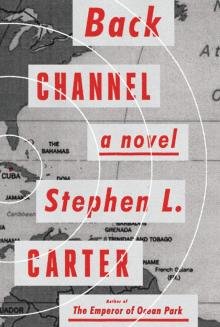 Back Channel
Back Channel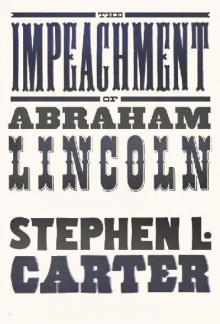 The Impeachment of Abraham Lincoln
The Impeachment of Abraham Lincoln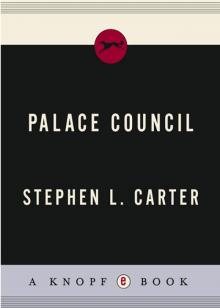 Palace Council
Palace Council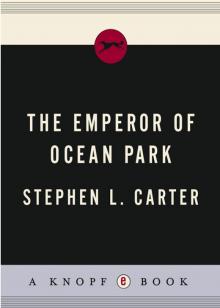 The Emperor of Ocean Park
The Emperor of Ocean Park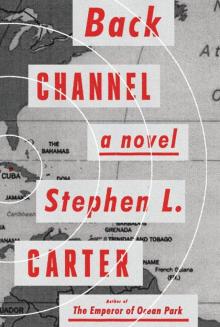 Back Channel: A novel
Back Channel: A novel Emperor of Ocean Park eh-1
Emperor of Ocean Park eh-1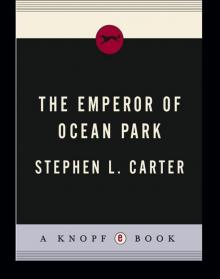 Emperor of Ocean Park
Emperor of Ocean Park